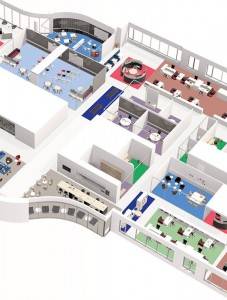 Whether we like it or not, we all have to work for some, or more usually, most of our adult life. During this time, many of us will work in an office, which is a place that has changed immensely – not only in the last ten years or so, but almost entirely since the start of the twentieth century. The management structure and style of companies, the tools available to the workforce, and the places within the office buildings have been changing and evolving. There has been a shift from hierarchical management structures to a more diverse and organic model. The tools of work have changed from the humble typewritten letter and Bakelite telephone to 24/7 access to emails though laptops and smart phones. And finally the workplace itself has evolved from one with enclosed offices for the senior managers, or a sea of cubicles to workplaces that encourage creativity and collaboration.
Whether we like it or not, we all have to work for some, or more usually, most of our adult life. During this time, many of us will work in an office, which is a place that has changed immensely – not only in the last ten years or so, but almost entirely since the start of the twentieth century. The management structure and style of companies, the tools available to the workforce, and the places within the office buildings have been changing and evolving. There has been a shift from hierarchical management structures to a more diverse and organic model. The tools of work have changed from the humble typewritten letter and Bakelite telephone to 24/7 access to emails though laptops and smart phones. And finally the workplace itself has evolved from one with enclosed offices for the senior managers, or a sea of cubicles to workplaces that encourage creativity and collaboration.
However, throughout all of this change, the needs of the people working have remained consistent. Whether it’s completing an important project, having your contribution recognised, or feeling like part of a group, there a set of six fundamental human needs that all people share – and all workplaces should meet – if they want their employees (and therefore their organisations) to thrive.
 Achievement
Achievement
We strive for excellence and take pride in our accomplishments
Achievement is strongly linked to a desire to not only take responsibility for our own work, but also to receive recognition for reaching the necessary standards. Motivation to achieve is at its greatest when the goals are attainable. A sense of achievement correlates with self-esteem, productivity and performance. It is in fact viewed as a personality trait that can be cultivated and developed.
Autonomy
We seek freedom in our actions and decisions
Autonomy or independence within our sphere of work is connected to job satisfaction and commitment to the organisation. More recently autonomy is the freedom to decide which tasks we will tackle, in which order and in which way, rather than simply on content. So, it might taking the time out to think about a project, or having the space to discuss an idea with colleagues.
However autonomy must be balanced against the needs of the wider team or organisation – if either the team or the individual have too much control over the other, then everyone’s work will become less effective.
 Belonging
Belonging
We want a meaningful connection to others
It is human nature to want to belong – we feel better if we are included, and is connected to reduced stress, enhanced engagement and productivity, and greater performance. The need to make connections within our social groups, work teams and the wider organisation is what drives us to share a tea break with others, or joining in with conversation.
Purpose
We want to make a difference
Purpose is experienced as a feeling of meaning in one’s work, and the feeling that the work matters. This feeling is fundamental to all, at any job or career level. It is strongly linked to attendance, engagement, job satisfaction and performance. Volunteer work shows just how significant purpose is to the workforce (in 2014 the voluntary section employed 821,000 people). People will work for free if it means they make a difference.
Security
We desire health, safety, familiarity and competence
As one of our fundamental needs security is about stability, predicable outcomes and knowing what to expect, as well as the more traditional feelings of physical safety and job security. Humans are creatures of habit – at work as well as home, we take comfort in familiar surroundings and routines. Security is considered a ‘lower order’ need and it is necessary to access higher order needs such as purpose. The absence of security can inhibit performance and negatively impact mental health. A paradox of a deeper understanding of security is that people often feel most secure if they are given a lot of flexibility.
Status
We seek recognition for our contributions
Status at work isn’t about a promotion or salary increase (though both are great). What status really means is that we are valued and appreciated by our peers. Humans are predisposed to seek out this recognition because when we receive it, our body releases the feel-good neurotransmitter serotonin. Status is also based on the group to which we belong, not only on a social or team level but also the status of the company itself – a prospective employee will consider whether they want to be associated with a brand.
______________________________
Jane Kendall-Bush is Workplace Design Strategist at Herman Miller

























January 8, 2016
The six things all people need from their workplace 0
by Jane Kendall-Bush • Comment, Facilities management, Knowledge, Workplace design
However, throughout all of this change, the needs of the people working have remained consistent. Whether it’s completing an important project, having your contribution recognised, or feeling like part of a group, there a set of six fundamental human needs that all people share – and all workplaces should meet – if they want their employees (and therefore their organisations) to thrive.
We strive for excellence and take pride in our accomplishments
Achievement is strongly linked to a desire to not only take responsibility for our own work, but also to receive recognition for reaching the necessary standards. Motivation to achieve is at its greatest when the goals are attainable. A sense of achievement correlates with self-esteem, productivity and performance. It is in fact viewed as a personality trait that can be cultivated and developed.
Autonomy
We seek freedom in our actions and decisions
Autonomy or independence within our sphere of work is connected to job satisfaction and commitment to the organisation. More recently autonomy is the freedom to decide which tasks we will tackle, in which order and in which way, rather than simply on content. So, it might taking the time out to think about a project, or having the space to discuss an idea with colleagues.
However autonomy must be balanced against the needs of the wider team or organisation – if either the team or the individual have too much control over the other, then everyone’s work will become less effective.
We want a meaningful connection to others
It is human nature to want to belong – we feel better if we are included, and is connected to reduced stress, enhanced engagement and productivity, and greater performance. The need to make connections within our social groups, work teams and the wider organisation is what drives us to share a tea break with others, or joining in with conversation.
Purpose
We want to make a difference
Purpose is experienced as a feeling of meaning in one’s work, and the feeling that the work matters. This feeling is fundamental to all, at any job or career level. It is strongly linked to attendance, engagement, job satisfaction and performance. Volunteer work shows just how significant purpose is to the workforce (in 2014 the voluntary section employed 821,000 people). People will work for free if it means they make a difference.
Security
We desire health, safety, familiarity and competence
As one of our fundamental needs security is about stability, predicable outcomes and knowing what to expect, as well as the more traditional feelings of physical safety and job security. Humans are creatures of habit – at work as well as home, we take comfort in familiar surroundings and routines. Security is considered a ‘lower order’ need and it is necessary to access higher order needs such as purpose. The absence of security can inhibit performance and negatively impact mental health. A paradox of a deeper understanding of security is that people often feel most secure if they are given a lot of flexibility.
Status
We seek recognition for our contributions
Status at work isn’t about a promotion or salary increase (though both are great). What status really means is that we are valued and appreciated by our peers. Humans are predisposed to seek out this recognition because when we receive it, our body releases the feel-good neurotransmitter serotonin. Status is also based on the group to which we belong, not only on a social or team level but also the status of the company itself – a prospective employee will consider whether they want to be associated with a brand.
______________________________
Jane Kendall-Bush is Workplace Design Strategist at Herman Miller